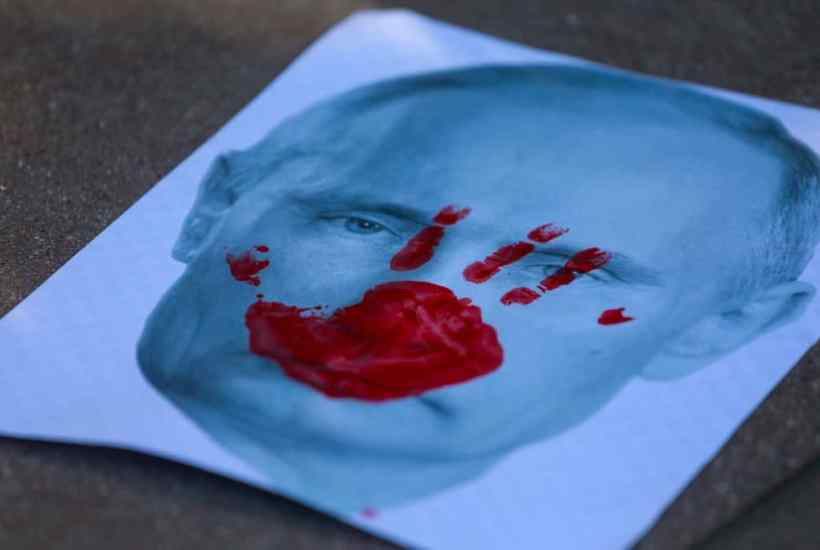‘Those he commands move only in command, nothing in love’. Shakespeare always gets it right. I remembered his words about Macbeth as I watched a shifty Vladimir Putin force the members of his Security Council to bob up and down as they tremulously affirmed their support for his wise policy on Ukraine. This enforced compliance among Russian’s politicians has continued in the days since, as Putin’s invasion of Ukraine has continued. Russian officials are not openly criticising Putin (yet). But the faces of his generals – serious professionals who know how dangerous these things are – spoke volumes as he ordered them to up the nuclear alert. And they will not be the only ones around him to worry. Meanwhile, artists and musicians, writers and journalists, ordinary members of the middle class – even children of Putin’s cronies – are going onto the streets to express their anger and shame at what he is doing. That takes courage when you know full well that the authorities’ reaction will be brutally physical.
We know little about what ordinary Russians feel. Polls suggest many buy the government line and blame the West and the Ukrainians. Many do not know what to think. Many will rally round the flag, as people do when their boys are in harm’s way.
But Russians have a long tradition of turning on their governments. Putin’s nightmare is that Russia might once again see the massive public demonstrations of 1989-1991 that contributed so much to the Soviet Union’s collapse. He is determined it should not happen. But he can never be sure. After all, people were distressingly willing to listen to the accusations so brilliantly propagated by Aleksei Navalny that he was running a government of thieves and liars. Putin dealt by that first by trying to have Navalny poisoned, and then locking him up and throwing away the key.
Another major reason why the Soviet Union collapsed was that it lost the battle of ideas. Many Russians believed, despite Soviet propaganda, that people really did live better in the West. They loved the clothes and the gadgets and the music that visiting foreigners brought with them. When Gorbachev finally made it possible, they flocked abroad to see for themselves. They may now be willing to tighten their belts for the sake of their beleaguered fatherland. But they will not thank Putin if access to information, holidays abroad and the availability of foreign goods are denied to them for too long.
This is where we need to insert the wedge: to convince the Russian people we sympathise with them in the nightmare that their leader has imposed on them, that we distinguish absolutely between him and them, that our sanctions are directly exclusively against him and his cronies. Russians are not brainwashed sheep. For good reason, based on long experience, most are sceptical of what their governments tell them. We must make it much harder for Putin’s lot to deny them the information they need to make up their own minds.
During the Cold War, we had an effective machine to convey our views convincingly to ordinary Russians and to counter Soviet attempts to manipulate our own public opinion. It was not a matter of simple fact-checking. We counterattacked with determination. We skewered the KGB’s campaigns to demonstrate that the Americans used chemical weapons during the Korean War, and that they deliberately spread HIV-AIDS.
We provided the Russians with large chunks of their own culture which they were denied by the Soviet regime. The CIA backed the British magazine Encounter, which subtly undermined the Communist message with outstanding literary comment. They infiltrated back into Russia the banned works of great writers like Pasternak, Solzhenitsyn and Grossman. Even those inside the KGB read these treasures avidly, because they too were nauseated by the conformist rubbish unloaded on them by the Soviet cultural machine.
In those days not many people knew or understood the Russians. Now this country is full of people who have lived and worked in Russia, and who have a sound idea of what motivates the people they associated with. We should harness them to a modernised version of the mechanisms we used to influence Russian attitudes in the past. We should systematically undermine Putin’s attempt to control the narrative by demanding, for example, that he produce the evidence for his grotesque claim that the Ukrainian government is committing ‘genocide’ against its Russian-speaking citizens. He knows it doesn’t exist. His people need to know it too.
And we should not forget the jokes. During Soviet times the mythical Radio Armenia used to run Q&A sessions. One listener allegedly asked: What is the difference between the dollar and the rouble? Answer: The dollar is backed by gold, the rouble by tanks. Another asked: Is it true that the Soviet Union is on the brink of an abyss? Answer: No. It used to be true, but since then we have taken a great step forward.
There was no need to invent the jokes. Russians were brilliant at doing that for themselves. All we had to do was to circulate them as widely as possible. It would cheer everyone up if we did it again.
Got something to add? Join the discussion and comment below.
Get 10 issues for just $10
Subscribe to The Spectator Australia today for the next 10 magazine issues, plus full online access, for just $10.



















Comments
Don't miss out
Join the conversation with other Spectator Australia readers. Subscribe to leave a comment.
SUBSCRIBEAlready a subscriber? Log in